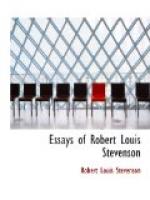Natural talk, like ploughing, should turn up a large surface of life, rather than dig mines into geological strata. Masses of experience, anecdote, incident, cross-lights, quotation, historical instances, the whole flotsam and jetsam of two minds forced in and in upon the matter in hand from every point of the compass, and from every degree of mental elevation and abasement—these are the material with which talk is fortified, the food on which the talkers thrive. Such argument as is proper to the exercise should still be brief and seizing. Talk should proceed by instances; by the apposite, not the expository. It should keep close along the lines of humanity, near the bosoms and businesses of men, at the level where history, fiction and experience intersect and illuminate each other. I am I, and You are You, with all my heart; but conceive how these lean propositions change and brighten when, instead of words, the actual you and I sit cheek by jowl, the spirit housed in the live body, and the very clothes uttering voices to corroborate the story in the face. Not less surprising is the change when we leave off to speak of generalities—the bad, the good, the miser, and all the characters of Theophrastus[8]—and call up other men, by anecdote or instance, in their very trick and feature; or trading on a common knowledge, toss each other famous names, still glowing with the hues of life. Communication is no longer by words, but by the instancing of whole biographies, epics, systems of philosophy, and epochs of history, in bulk. That which is understood excels that which is spoken in quantity and quality alike; ideas thus figured and personified, change hands, as we may say, like coin; and the speakers imply without effort the most obscure and intricate thoughts. Strangers who have a large common ground of reading will, for this reason, come the sooner to the grapple of genuine converse. If they know Othello and Napoleon, Consuelo and Clarissa Harlowe, Vautrin and Steenie Steenson,[9] they can leave generalities and begin at once to speak by figures.
Conduct and art are the two subjects that arise most frequently and that embrace the widest range of facts. A few pleasures bear discussion for their own sake, but only those which are most social or most radically human; and even these can only be discussed among their devotees. A technicality is always welcome to the expert, whether in athletics, art or law; I have heard the best kind of talk on technicalities from such rare and happy persons as both know and love their business. No human being[10] ever spoke of scenery for above two minutes at a time, which makes me suspect we hear too much of it in literature. The weather is regarded as the very nadir and scoff of conversational topics. And yet the weather, the dramatic element in scenery, is far more tractable in language, and far more human both in import and suggestion than the stable features of the landscape. Sailors and shepherds, and the people generally of




